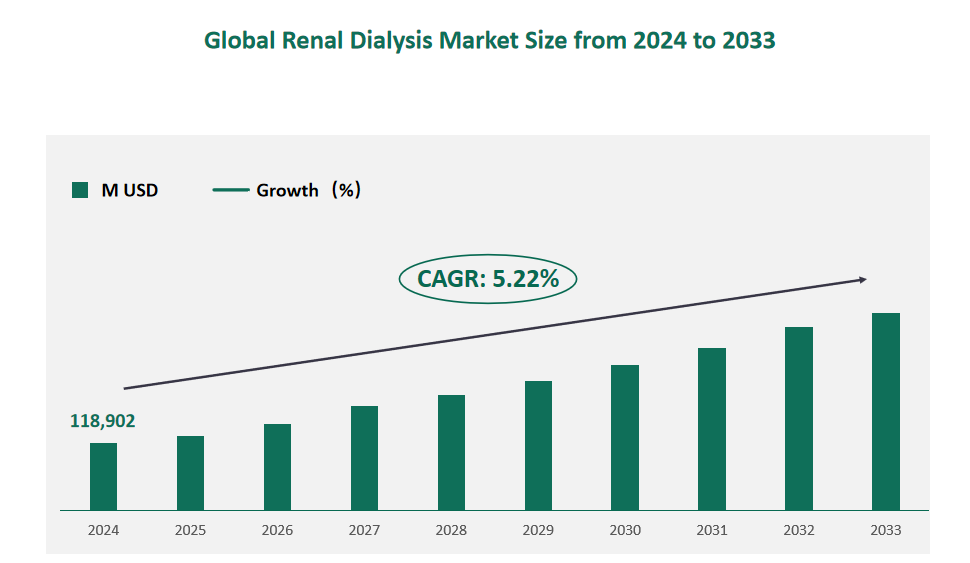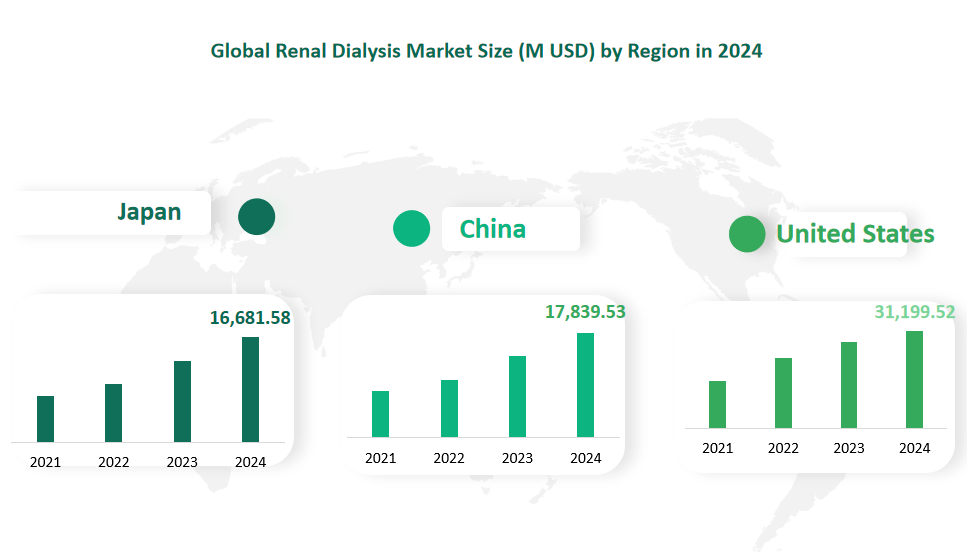1 Global Renal Dialysis Market Size (Value) and CAGR (2024-2033)
In 2024, the global Renal Dialysis market was valued at USD 118,902 million, with a CAGR of 5.22% from 2024 to 2033.
Renal dialysis is a procedure wherein toxic substances, such as urea and creatinine, are removed from the body. This procedure is one of the lifesaving treatments for a patient who has suffered from kidney failure due to chronic renal disease.
Figure Global Renal Dialysis Market Size (M USD) and CAGR 2024-2033

2 Renal Dialysis Market Drivers
One of the most significant drivers of the renal dialysis market is the increasing incidence of kidney diseases worldwide. Chronic kidney disease (CKD) and end-stage renal disease (ESRD) are becoming more prevalent in both developed and developing countries. According to the European Renal Care Providers Association, there are approximately 1,160 chronic kidney disease patients per million people in the European Union. In the United States, the National Kidney Foundation reports that around 37 million people suffer from chronic kidney disease.
Another key driver of the renal dialysis market is the substantial investment in research and development (R&D) by both public and private entities. Companies are focusing on developing advanced dialysis technologies, such as more efficient dialysis machines, improved dialyzers, and portable dialysis equipment. These innovations aim to enhance the effectiveness and accessibility of renal care. For instance, Fresenius Medical Care and B. Braun are actively involved in developing technologically advanced dialysis solutions to meet the growing demand from patients and healthcare providers. The introduction of new products and technologies not only improves the quality of care but also drives market growth by creating new opportunities for market expansion.
Regulatory bodies, such as the US Food and Drug Administration (FDA), are playing a crucial role in supporting the development and approval of innovative renal care solutions. The FDA’s approval of novel devices and technologies encourages companies to invest in R&D and bring new products to market. For example, Fresenius Medical Care received breakthrough device designation from the FDA for its new hemodialysis system, which is designed to prevent blood clotting without the use of blood thinners. This regulatory support not only accelerates the adoption of advanced technologies but also fosters a competitive environment that drives market growth.
3 Renal Dialysis Market Restraints
The renal dialysis market is highly competitive, with numerous players vying for market share. This intense competition can lead to challenges for companies in terms of maintaining profitability and sustaining their market positions. Companies must continuously invest in R&D to develop innovative products and technologies to stay ahead of their competitors. The need to differentiate products and services, coupled with the pressure to reduce costs, can strain the resources of companies operating in this market.
Kidney transplantation is an alternative treatment option for patients with ESRD and advanced CKD. The increasing preference for kidney transplantation over dialysis is a significant restraint for the renal dialysis market. Transplantation offers better long-term outcomes, improved quality of life, and lower mortality rates compared to dialysis.
4 Global Renal Dialysis Market Size by Type in 2024
Hemodialysis: This is the most prevalent form of primary dialysis, accounting for USD 77,129 million in 2024. Hemodialysis involves the use of a machine to filter waste products and excess fluids from the blood. The process typically requires the patient to visit a dialysis center or hospital, where their blood is circulated through a dialyzer (an artificial kidney) that removes toxins and excess fluids. Hemodialysis is usually performed three times a week for about three to four hours per session.
Hemofiltration: Hemofiltration is a form of renal replacement therapy used primarily in intensive care settings. It accounted for USD 9,591 million in 2024. Hemofiltration works by passing the patient’s blood through a filtration circuit to a semipermeable membrane, where waste products and water are removed by convection. This method is particularly effective for treating acute kidney injury (AKI) and can be beneficial in managing multiple organ dysfunction syndrome or sepsis.
Peritoneal Dialysis: Peritoneal Dialysis (PD) is a type of dialysis that uses the peritoneum (a membrane in the abdomen) to filter waste products and excess fluids from the blood. It accounted for USD 17,284 million in 2024. PD is often performed at home and offers greater flexibility and better tolerability for patients with significant heart disease. The process involves the insertion of a catheter into the peritoneal cavity, through which a dialysis solution is introduced and drained periodically.
Table Global Renal Dialysis Market Size by Type in 2024
Type | Market Size (M USD) 2024 |
Hemodialysis | 77129 |
Hemofiltration | 9591 |
Peritoneal Dialysis | 17284 |
5 Global Renal Dialysis Market Size by Application in 2024
Hospitals are a critical end-user segment in the renal dialysis market, providing comprehensive renal care for patients with acute and chronic kidney conditions. In 2024, the hospital segment is projected to be valued at USD 27,163 million. Hospitals offer a wide range of renal services, including hemodialysis, peritoneal dialysis, and kidney transplantation. They are equipped with advanced medical facilities and staffed by nephrologists, nurses, and other healthcare professionals who specialize in renal care. Hospitals often serve as the primary point of care for patients with severe kidney failure, especially those requiring emergency or intensive care.
Dialysis Centers are specialized facilities that focus exclusively on providing renal dialysis treatments. This segment accounted for the largest market share in 2024, with a value of USD 77,292 million. Dialysis centers are staffed with doctors, nurses, and technicians who have specialized training in chronic kidney disease. These centers offer both hemodialysis and peritoneal dialysis services and are designed to provide long-term care for patients with CKD and ESRD. The growing prevalence of kidney diseases has led to an increase in the number of dialysis centers worldwide, making them a crucial component of the renal care ecosystem.
Home Care Settings represent a growing trend in renal dialysis, offering patients the convenience and flexibility of receiving treatment in the comfort of their homes. In 2024, the home care segment is projected to be valued at USD 14,447 million. Home-based dialysis treatments, such as home hemodialysis and peritoneal dialysis, are becoming increasingly popular due to their cost-effectiveness and improved quality of life for patients. Governments and healthcare providers are also promoting home-based treatments through new payment models and policies, further driving the growth of this segment.
Table Global Renal Dialysis Market Size by Application in 2024
Application | Market Size (M USD) 2024 |
Hospitals | 27163 |
Dialysis Centers | 77292 |
Home Care Settings | 14447 |
6 Global Renal Dialysis Market Size by Region in 2024
The United States is a major player in the global renal dialysis market, with a projected market value of USD 31,199.52 million in 2024. The US market is characterized by advanced healthcare facilities, a high prevalence of chronic kidney disease, and significant investments in research and development. The country is home to several leading dialysis providers and manufacturers, such as DaVita Healthcare Partners and Fresenius Medical Care, which offer a wide range of renal services and products. The US government also plays a crucial role in promoting renal care through policies and initiatives aimed at improving access to dialysis treatments and kidney transplantation.
China is experiencing rapid growth in its renal dialysis market, driven by the increasing prevalence of kidney diseases and the expansion of healthcare infrastructure. In 2024, the Chinese market is projected to be valued at USD 17,839.53 million. China’s large population and growing middle class have led to a significant increase in the demand for renal care services. The government has been investing heavily in healthcare facilities and technologies to improve the availability and quality of dialysis treatments. Additionally, the country is focusing on promoting home-based dialysis treatments to address the growing patient population and reduce the burden on healthcare facilities.
Japan is another key player in the global renal dialysis market, with a projected market value of USD 16,681.58 million in 2024. The Japanese market is characterized by advanced medical technologies and a high prevalence of kidney diseases. Japan has a well-established healthcare system that provides comprehensive renal care services, including hemodialysis, peritoneal dialysis, and kidney transplantation. The country is also at the forefront of research and development in renal care, with several innovative technologies and treatments being developed and adopted. The aging population in Japan further drives the demand for renal dialysis services, making it a crucial segment of the healthcare industry.
Figure Global Renal Dialysis Market Size by Region in 2024

7 Major Players in Global Renal Dialysis Market
7.1 Fresenius Medical Care AG & Co. KGaA
Company Profile
Fresenius Medical Care AG & Co. KGaA is the world’s leading provider of dialysis products and services, with a global network of over 4,000 dialysis clinics. Established in 1996, the company is headquartered in Germany and operates in over 20 countries. Fresenius Medical Care is dedicated to improving the quality of life for patients with chronic kidney failure through innovative products and services.
Business Overview
Fresenius Medical Care offers a comprehensive range of dialysis products, including dialysis machines, dialyzers, and related disposables. The company’s services extend to both hospital-based and home-based dialysis treatments. In addition to its extensive product portfolio, Fresenius Medical Care is also involved in research and development, aiming to advance renal care through innovative technologies.
Services Offered
Fresenius Medical Care provides a wide array of services, including hemodialysis, peritoneal dialysis, and home hemodialysis. Their dialysis machines and dialyzers are designed to offer high efficiency and patient comfort. The company also offers comprehensive care management services, ensuring that patients receive personalized and effective treatment plans.
Recent Financial Data
In 2020, Fresenius Medical Care reported a revenue of USD 18,464.5 million.
7.2 DaVita Healthcare Partners, Inc.
Company Profile
DaVita Healthcare Partners, Inc. is a leading provider of kidney dialysis services, with a strong focus on integrated kidney care. Established in 1994 and headquartered in the United States, DaVita operates a large network of dialysis centers and provides comprehensive care for patients with chronic kidney failure.
Business Overview
DaVita’s business model is centered around delivering holistic kidney care through its extensive network of dialysis centers. The company offers a range of services, including hemodialysis, peritoneal dialysis, and home-based treatments. DaVita is also involved in disease management, vascular access services, and clinical research programs, aiming to improve patient outcomes and quality of life.
Services Offered
DaVita provides comprehensive kidney care services, including hemodialysis, peritoneal dialysis, and home hemodialysis. The company’s dialysis centers are staffed with experienced nephrologists and nurses who specialize in renal care. DaVita also offers integrated kidney care programs, ensuring that patients receive coordinated and personalized treatment plans.
Recent Financial Data
In 2020, DaVita Healthcare Partners reported a revenue of USD 11,895.9 million.
7.3 Baxter International Inc.
Company Profile
Baxter International Inc. is a global medical products company with a strong focus on renal care. Established in 1931 and headquartered in the United States, Baxter offers a wide range of products and technologies for the treatment of kidney diseases. The company is known for its innovative solutions and commitment to improving patient outcomes.
Business Overview
Baxter’s business spans across various medical fields, including renal care, hemophilia, immune disorders, and infectious diseases. The company’s renal care portfolio includes dialysis machines, dialyzers, and peritoneal dialysis solutions. Baxter is also involved in research and development, aiming to advance renal care through innovative technologies and products.
Services Offered
Baxter offers a comprehensive range of renal care services, including hemodialysis, peritoneal dialysis, and home-based treatments. The company’s dialysis products are designed to provide high efficiency and patient comfort. Baxter also offers specialized services, such as vascular access solutions and home care support, ensuring that patients receive comprehensive and personalized care.
Recent Financial Data
In 2020, Baxter International Inc. reported a revenue of USD 3,735.4 million.

